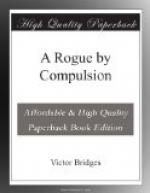With a lightning-like movement McMurtrie slipped his right hand into his side pocket, and as he did so Latimer instantly levelled his pistol. The two shots rang out simultaneously, but except for a cry and a crash of broken glass I knew nothing of what had happened. In one stride I had flung myself on Savaroff, and just as he drew his revolver I let him have it fair and square on the jaw. Dropping his weapon, he reeled backwards into von Bruenig, and the pair of them went to the floor with a thud that shook the building. Almost at the same moment both the door and the window burst violently open, and two men came charging into the room.
The first of the intruders was Tommy Morrison. I recognized him just as I was making an instinctive dive for Savaroff’s revolver, under the unpleasant impression that Hoffman and the other German had returned from the post-office. You can imagine the delight with which I scrambled up again, clutching that useful if rather belated weapon in my hand.
One glance round showed me everything there was to see.
Face downwards in a little pool of blood lay the motionless figure of McMurtrie. Savaroff also was still—his huge bulk sprawled in fantastic helplessness across the floor. Only von Bruenig had moved; he was sitting up on his hands, staring in a half-dazed fashion down the barrel of Latimer’s Mauser.
It was Latimer himself who renewed the conversation.
“Come and fix up these two, Ellis,” he said. “I will see to the other.”
The man who had burst in with Tommy, a lithe, hard-looking fellow in a blue suit, walked crisply across the room, and pulling out a pair of light hand-cuffs snapped them round von Bruenig’s wrists. He then performed a similar service for the still unconscious Savaroff.
The next moment Latimer, Tommy, and I were kneeling round the prostrate figure of the doctor. We lifted him up very gently and turned him over on to his back, using a rolled-up rug as a pillow for his head. He had been shot through the right lung and was bleeding at the mouth.
Latimer bent over and made a brief examination of the wound. Then with a slight shake of his head he knelt back.
“I’m afraid there’s no hope,” he remarked dispassionately. “It’s a pity. We might have got some useful information out of him.”
There was a short pause, and then quite suddenly the dying man opened his eyes. It may have been fancy, but it seemed to me that for a moment a shadow of the old mocking smile flitted across his face. His lips moved, faintly, as though he were trying to speak. I bent down to listen, but even as I did so there came a fresh rush of blood into his throat, and with a long shudder that strange sinister spirit of his passed over into the darkness. I shall always wonder what it was that he left unsaid.
CHAPTER XXIV
EXONERATED




